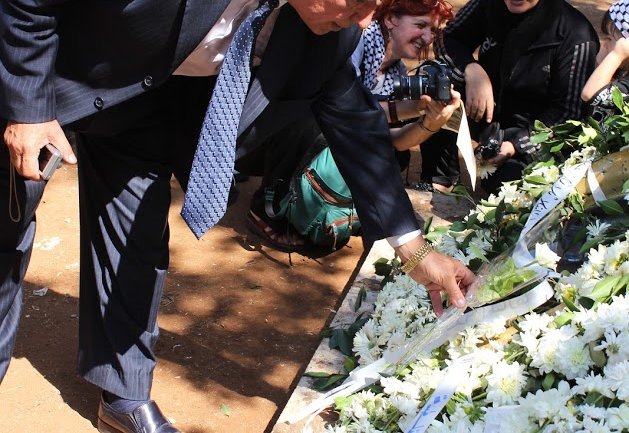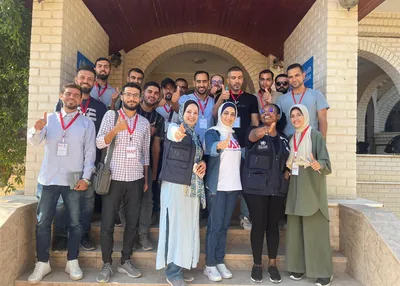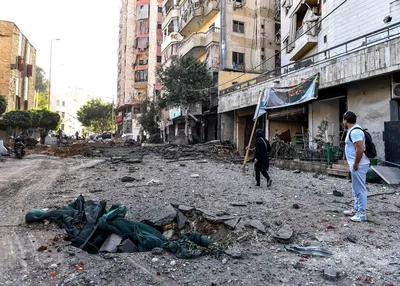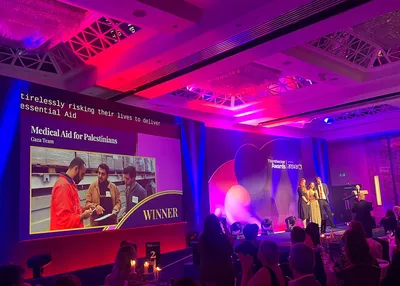Remembering the victims and survivors of the Sabra and Shatila massacre

MAP's Director of Programmes in Lebanon, Dr Ali Dakwar, lays a wreath at a memorial service for the Sabra and Shatila massacre.
Below are the words of MAP co-founder Dr Swee Ang, who was working in a hospital inside the camp at the time, published in Middle East Monitor last year.
Thirty-Five years ago as Israel overran West Beirut, Lebanese Christian militiamen entered the Palestinian refugee camps of Sabra and Shatila in West Beirut. Over three days, Israeli forces sealed the camp and allowed them to slaughter several thousand refugees.
I was then a young orthopedic trainee who had resigned from St. Thomas Hospital in London to join a Christian Aid medical team helping those wounded during Israel’s invasion of Lebanon a few months earlier. Beirut was under siege. Water, food, electricity and medicines were blockaded. The invasion left thousands dead and wounded, and made an estimated 100,000 people homeless.
I was seconded to the Palestine Red Crescent Society to take charge of the orthopedic department in Gaza Hospital in the Sabra and Shatila camp in West Beirut. I met Palestinian refugees in their bombed out homes and learned how they became refugees in one of the 12 Palestinian camps in Lebanon. Until then I did not know Palestinians existed.
They recalled how they were driven out of their homes in Palestine in 1948, often at gunpoint. They fled with whatever possessions they could carry and found themselves in neighbouring Lebanon, Jordan and Syria.
The United Nations put them in tents while the world promised they would return home soon. That expectation never materialised. This is their 69th year living as refugees. Palestine was erased from the map of the world. The 750,000 refugees, comprising half of the population of Palestine in 1948, have grown to 5 million.
Soon after my arrival in Beirut, Yasser Arafat’s Palestine Liberation Organization (PLO) left the city. It was the price demanded by Israel to stop further bombardment of Lebanon and to lift the 10-week military blockade. Fourteen thousand men and women left Lebanon after a guarantee by western powers that their families who were left behind would be protected by a multinational peacekeeping force.
Those leaving were fighters, civil servants, doctors, nurses, lecturers, unionists, journalists, engineers and technicians. The PLO was the Palestinians’ government in exile, and the largest employer. Thousands of Palestinian families, many of whom had lost members in the invasion, now were without their breadwinner, often the father or the eldest brother in the family.
The cease-fire lasted only three weeks. The multinational peacekeeping force, entrusted by the cease-fire agreement to protect civilians, abruptly withdrew. Shortly after, Lebanon’s newly installed Christian president, Bashir Gemayel, was assassinated.
Then, on September 15, several hundred Israeli tanks drove into West Beirut. Some of them ringed and sealed Sabra and Shatila, preventing the inhabitants from fleeing. A group of Christian militiamen, trained and armed by Israel, entered the camp. When the tanks withdrew from the perimeter of the camp on September 18, several thousand civilians were found dead inside the camp, while others had been abducted and disappeared.
Our hospital team, who had worked nonstop for 72 hours, was ordered to leave our patients at machine-gun point, and marched out of the camp on September 18. As I emerged from the basement operating theater, I learned the painful truth. While we were struggling to save a few dozen lives, people were butchered by the thousands.
Some of the bodies were already rotting in the hot Beirut sun. The images of the massacre were deeply seared into my memory. They included dead and mutilated bodies lining the camp alleys. Only a few days before, they were human beings full of hope and life, trusting that they would be left in peace to raise their children after the evacuation of the PLO.
These were people who welcomed me into their broken homes. They served me Arabic coffee and whatever food they found, simple fare but given with warmth and generosity. They shared with me their broken lives. They showed me faded photographs of their homes and families in Palestine before 1948 and the large house keys they still kept with them. The women shared with me their beautiful embroidery, each with motifs of the villages they left behind. Many of these villages were destroyed after they left.
During the massacre, some of these people became patients we failed to save. Others died on arrival. They left behind orphans and widows. A wounded mother begged us take down the hospital’s last unit of blood from her to give to her child. She died shortly afterwards. Children who witnessed their mothers and sisters being raped and killed would always bear the trauma.
The terrified faces of families rounded up by gunmen while awaiting death; the desperate young mother who tried to give me her baby to take to safety; the stench of decaying bodies as mass graves were uncovered; the piercing cries of women who discovered the remains of their loved ones from bits of clothes and refugee identity cards – these memories will never leave me.
The survivors returned to live in the very homes where their families and neighbours were massacred. They are a courageous people, and there was nowhere else to go.
Today, Palestinian refugees in Lebanon are barred from 30 syndicated professions, and only two percent of Palestinians in nonprofessional jobs have proper work permits. They do not have passports. They are prohibited from owning and inheriting properties. Denied the right of return to their homes in Palestine, they are not only born refugees, they will grow up as refugees and die refugees.
As for me, I still have painful questions that need to be answered. Why were they massacred? Has the world forgotten the survivors? How can we allow a situation where a person’s only claim to humanity is a refugee identity card? These questions have haunted me since I first met the Palestinian refugees of Sabra and Shatila. I have yet to receive an answer.
Related content


